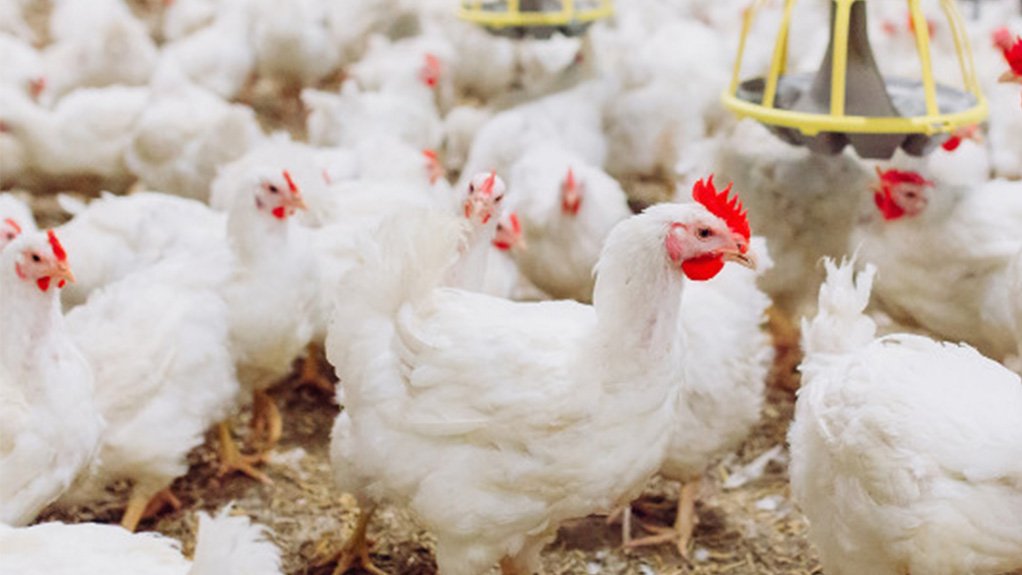Poultry industry association calls for antidumping duties to be reinstated
Industry organisation the South African Poultry Association (SAPA) has released a report showing that the imposition of antidumping duties of 30% will contribute to a price increase of between 0.9% and 4.9% for chicken products in retail outlets, while also protecting the internationally competitive local industry from unfair and predatory trade practices.
By comparison, the longer and more frequent loadshedding over the past year has increased prices by 10% for the eight large local producers and about 20% for smaller producers. The more severe loadshedding has added about R1.20/kg to the price of chicken products in retail outlets, SAPA GM Izaak Breitenbach said in a briefing on July 20.
The lack of service delivery has also had a dramatic impact on consumer pricing. The potential passthrough of dumping duties to consumers is less than the price inflation brought on by loadshedding and feed cost, he added.
The industry called on Trade, Industry and Competition Minister Ebrahim Patel to instate antidumping duties that had been suspended. The antidumping duties set to be reinstated in August would be lower than the 30% provisional antidumping duties imposed from January to July 2022, which were based on the recommendations of trade authority the International Trade Administration Commission (Itac), he noted.
SAPA had commissioned independent economics firm Genesis Analytics to produce a report on the impact of antidumping duties, which are imposed over and above general import tariffs, on the retail price of chicken products.
Prior to 2022, Itac had investigated and concluded that some poultry-exporting companies in Brazil, Denmark, Ireland, Poland and Spain are participating in the dumping of chicken products in South Africa and causing material harm to the South African poultry industry, said Genesis Analytics competition and regulatory economics practice principal and report lead author André Frauenknecht.
Dumping refers to the practice whereby a company exports a product at a price that is lower in the importing market than the price in its domestic market.
The price increase of chicken products in retail outlets if antidumping tariffs of 30% were imposed would be in the 2.5% to 4.5% range. However, there is also significant variance in the quantum of duties imposed on importing firms within countries. For example, Brazilian exporters could have duties imposed that range from 6% to 48% of the total antidumping tariff.
This variance and changes in markets that South Africa is importing from will further dilute or attenuate the impact on local prices, he said.
"According to the Bureau for Food and Agricultural Policy, South Africa is one of the top three most competitive poultry producers in the world and produces the cheapest chicken South African rands can buy.
"The industry does not need protection, as it is globally competitive, but does need to be shielded from unfair trade practices – in this case, the dumping of chicken products," said Breitenbach.
Further, the chicken products dumped in South Africa by some companies in these five countries are also owing to the fact that there is limited demand for these products in their local markets. For example, European consumers tend to prefer white chicken meat, hence the lack of demand for bone-in chicken and individual quick freezing chicken pieces.
These chicken products serve as the cheapest source of protein for South African consumers.
Patel suspended the provisional antidumping duties for a period of twelve months in July 2022, owing to concerns about the impact on the prices of these categories of chicken products.
However, there has been no evidence of a reduction in prices of locally sold imported chicken products during the past year, but there has been a 600% increase in chicken imports from 17 000 t imported in October to 46 000 t imported in March. This threatens the local poultry industry and the jobs it provides, despite the increase in imports being the result of unfair and anticompetitive trade practices, highlighted Breitenbach.
Additionally, South Africa imports about 30% of locally sold chicken products, which is dramatically more than the markets it trades with.
For example, the US, which exports chicken products to South Africa but does not participate in unfair trade practices, imports less than 1% of its chicken products. Brazil imports less than 1% of its chicken products and Europe imports less than 7% of its chicken products, he noted.
This reliance on imports also impacts on food security. For example, if an importing country were to stop exports owing to avian influenza, then the prices in South Africa would rise proportionally.
"Local production makes countries more food secure and ensures long-term pricing stability," Breitenbach noted.
"During discussions as part of the poultry industry master plan, in 2019, we highlighted that dumping was destroying jobs and the industry could not grow the value chain because we had to compete with companies dumping products in our market."
During the decade preceding the industry master plan, the industry's total output stagnated and dumped imports eroded its market share. The industry needed to address the impact of unfair imports as it has the largest negative impact on the local industry.
"However, antidumping duties have made investment and growth more sustainable. The industry has invested R2.1-billion and created 5 000 jobs over the past four years and has increased its capacity to 22.5-million birds a week, following decades of market contraction," he said.
SAPA had sent the report to the Department of Trade, Industry and Competition and, although Patel was directed by Itac to consult with the industry to review the suspension of the antidumping duties prior to the reimposition of antidumping tariffs, he has not yet engaged with the industry, despite the deadline for new duties fast approaching, Breitenbach said.
He added that the industry remained ready and open to discussions with the Minister about the role of antidumping duties in the local market and its impact on consumers.
Comments
Press Office
Announcements
What's On
Subscribe to improve your user experience...
Option 1 (equivalent of R125 a month):
Receive a weekly copy of Creamer Media's Engineering News & Mining Weekly magazine
(print copy for those in South Africa and e-magazine for those outside of South Africa)
Receive daily email newsletters
Access to full search results
Access archive of magazine back copies
Access to Projects in Progress
Access to ONE Research Report of your choice in PDF format
Option 2 (equivalent of R375 a month):
All benefits from Option 1
PLUS
Access to Creamer Media's Research Channel Africa for ALL Research Reports, in PDF format, on various industrial and mining sectors
including Electricity; Water; Energy Transition; Hydrogen; Roads, Rail and Ports; Coal; Gold; Platinum; Battery Metals; etc.
Already a subscriber?
Forgotten your password?
Receive weekly copy of Creamer Media's Engineering News & Mining Weekly magazine (print copy for those in South Africa and e-magazine for those outside of South Africa)
➕
Recieve daily email newsletters
➕
Access to full search results
➕
Access archive of magazine back copies
➕
Access to Projects in Progress
➕
Access to ONE Research Report of your choice in PDF format
RESEARCH CHANNEL AFRICA
R4500 (equivalent of R375 a month)
SUBSCRIBEAll benefits from Option 1
➕
Access to Creamer Media's Research Channel Africa for ALL Research Reports on various industrial and mining sectors, in PDF format, including on:
Electricity
➕
Water
➕
Energy Transition
➕
Hydrogen
➕
Roads, Rail and Ports
➕
Coal
➕
Gold
➕
Platinum
➕
Battery Metals
➕
etc.
Receive all benefits from Option 1 or Option 2 delivered to numerous people at your company
➕
Multiple User names and Passwords for simultaneous log-ins
➕
Intranet integration access to all in your organisation





















